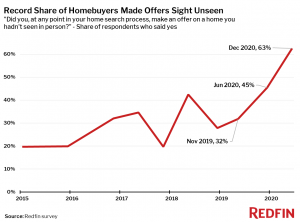Real Estate Shifts to Accommodate Customers in the Virtual Age
More buyers and sellers are using online resources to support a streamlined buying and selling process. What’s driving this innovation, and how will it impact the future of real estate?
In 2020, pandemic-related business closures forced us to make creative use of our at-home space. Kitchen tables became office desks, bathrooms were converted to temporary hair salons, virtual school sessions took place in bedrooms, and living rooms served as home movie theaters. As a result, people who once viewed their homes as just a place to hang their hats suddenly desired amenities like a big backyard and a home office. That motivation, coupled with historically low interest rates, caused home buying to explode in 2020. About 19% more new homes were sold in 2020 than in 2019, according to Census data.

Bill Golden
Bill Golden, associate broker at RE/MAX Around Atlanta, said he had one of his best years yet, and that was largely due to factors related to COVID-19.
“People either need home office space or they need space for someone to help with the kids or they’re moving to be closer to family who can help with the kids,” he said. “A lot of people are realizing that they don’t need to live close to their office.”
Not only has the pandemic changed what people are looking for in their residence, but it has also caused the home buying (and selling) process to evolve. Even before the pandemic, homebuyers were becoming savvier, using online tools to aid in their search. Now, as online real estate transactions have become necessarily more common, real estate agents have had to adapt to the changing needs of their clients. And, new startups are further disrupting traditional notions of how real estate should work.
COVID-19 has accelerated online home buying
In 2020, 63% of buyers made an offer on a home sight unseen, nearly double the share that did so in 2019, according to data from Redfin. That’s the highest that figure has been since Redfin started tracking it. What caused this unprecedented spike? COVID-19 restrictions, along with a new group of homebuyers who are more comfortable transacting online: Millennials.
The pandemic was the push millennials needed to become first-time homebuyers
Millennials, who entered adulthood in the years after the Great Recession, have dealt with rising costs of living, educational expenses, and healthcare costs along with wages that haven’t kept pace with these increases. As a result, many delayed life milestones like buying a home and starting a family. Before the pandemic hit, the Government Accountability Office (GAO) found that only 43% of millennials were homeowners, compared to 51% of the previous generation of households when they were at the same age.
So the country’s largest generation has some catching up to do, and the pandemic has created an ideal opportunity for young people to break into homeownership. A survey of millennials from Realtor.com and HarrisX revealed that 75% of respondents have been working from home since the pandemic started. And 63% of those who no longer need to commute said that caused them to plan a home purchase. Overall, almost half of millennials said the pandemic pushed ahead their timeline for buying a home. Ellie Mae reported that millennials accounted for more closed purchase home loans in the second quarter of 2020 than any other generation. Experts say it’s just the beginning of a boom for millennial home buying.

Monica Campbell
Millennials tend to favor digital processes in general, and 59% of millennials also said their strategy for looking for homes changed due to COVID-19. Many spent more time researching online and viewing photos and videos. That means that marketing properties online has become even more important, according to Monica Campbell, listing agent with eXp Realty in Southern California.
“Because we are an online-based business, it’s very important for agents to be conscious of that and make sure that they’re showing the property well online,” she said.
Professional photography, staging, and tools like 3D virtual tours and video walkthroughs are essential for homebuyers to assess a property without seeing it in-person.
Public health concerns and competition necessitated virtual showings and online sales
It’s not just millennials who are taking a different approach to the home buying process. The pandemic has changed the way everyone looks for property. Concerns over COVID-19 safety have led to a steep drop in open houses. The National Association of Realtors (NAR) reports that 40% of realtors have ceased hosting open houses for their clients. And even individual showings are going the virtual route as many buyers seek to narrow down their options from home rather than risking COVID-19 exposure. Funding has been pouring in for property technology startups that provide agents with tools for virtual tours.
Golden said the competition for homes has led some of his clients to buy homes sight unseen as well. “It’s such a tight market for buyers that they can’t afford to wait around until they happen to be in town,” he said. However, he noted that most buyers will send a local friend or family member to view the property before they make an offer.
Related: More Space, Higher Prices: Home Sales After Covid-19
The real estate industry is evolving
Even before the pandemic, 93% of homebuyers used the internet as a resource in their home search, according to the NAR. And 52% of buyers ended up purchasing a home that they discovered online. That number has been climbing since 2013, when the NAR began tracking these trends.
“People are definitely doing more of the research and prep work online before they go see houses,” Golden said.
That’s led to high performance among companies in the online real estate space in the past year. Analysts say the increase in online real estate activity is partially responsible for the rising prices of shares in companies like Zillow and Redfin, which have skyrocketed 500% and 700% since March 2020, respectively. As more people turn to these resources, real estate agents may need to do more to prove their value.
“Real estate agents are going to really have to step it up as clients are getting more savvy with online searches,” Campbell noted.
Since buyers are able to view the same properties listed in the MLS on sites like Zillow and Realtor.com, Campbell said that real estate agents need to go further to help the buyer by leveraging their personal networks.
“There have been instances lately that I’ve been able to match people up without even having it go to market,” she said. That’s an invaluable service that most buyers wouldn’t have access to on their own.
But it’s not just the digital search process that has changed the role of the real estate agent. New startups, many of which rely on artificial intelligence technology, are disrupting the way people buy and sell homes.
New online tools are changing real estate transactions
In a survey from Homes.com, about 40% of Americans called buying a home “the most stressful event in modern life,” so it’s no wonder that new business models target providing convenience and reducing stress for homebuyers. Companies like Orchard and Knock are simplifying the process for families that need to move before they can sell by providing both financing for the new home and listing assistance for the old home.
Other companies are focused on cutting costs surrounding real estate transactions. Homie is a startup that provides buyers with access to a team of lawyers, agents, and other experts for a flat fee. This allows sellers to avoid real estate commissions and gives buyers a refund to help with closing costs. Rex Real Estate Exchange uses an automated process to list and market homes, charging sellers only 2% of their home’s sale price.
Some companies are removing the need for real estate agents altogether by taking the home selling process off-market. iBuyers such as OpenDoor and OfferPad are able to leverage technology to make cash offers on homes without sellers ever needing to go through a traditional listing process. Both companies make initial cash offers sight unseen. However, recent research has revealed that iBuying is associated with high fees totaling 13% to 15% of the sale price. The Consumer Federation of America warns home sellers to compare those fees against the costs incurred through a traditional sale.
Sundae is different from an iBuyer in that the company focuses on helping sell houses that need significant updates or repairs. iBuyers typically don’t purchase those kinds of houses. Most iBuyers also provide an offer before seeing the house. Sundae’s Market Experts complete an in-home visit to calculate a fair offer range that doesn’t come with any hidden fees. Sellers may also be eligible to get a $10,000 cash advance after their inspection to help with moving costs or other expenses.
Are these new startups a threat to real estate agents? Probably not, according to Campbell and Golden.
“Most people still want the help of a real person that’s there, knows the market, knows the neighborhood, and knows what they’re doing. So I definitely don’t see that as a long-term disruptor,” Golden said. Indeed, the share of buyers using a real estate agent has continued to increase since 2001 and now sits at 88%.
“A lot of people still are looking for guidance,” Campbell said. “They’re looking for somebody who has the knowledge to help them and to see things that they don’t see and to help them understand things they don’t understand.”
For the time being, at least, Sundae, a marketplace for distressed homes, and real estate agents are serving different demographics. Sellers who want the highest possible offer price for their home are likely to consult a traditional real estate agent, while sellers who need fast cash for their old houses are more likely to pursue an off-market sale. Still, that doesn’t necessarily mean real estate agents shouldn’t change the way they work. They’ll still need to take advantage of digital tools to compete in an industry that has shifted towards online transactions.
Related: 2021 Housing Market Trends: Another Year of Growth
Real estate professionals are expanding their reach with social media and other digital tools
Golden said you have to go where people live, and it’s no secret that most Americans spend a significant amount of time on social media platforms like Facebook, Instagram, and TikTok. The NAR reports that realtors cite social media as the best way to generate high-quality leads. And everyday real estate professionals, from home inspectors to agents, are becoming influencers on social media by showcasing their personalities in addition to marketing their services. Social media is an especially important tool for reaching Gen Zers and Millennials, who are more likely to engage with influencers and are also more likely to begin their home search online.
@fellingissellingGreat Price ???? ##fellingisselling ##dfwrealtor ##moving ##investment ##realestate ##hometour ##housetour ##homebuying ##stoprenting ##fyp ##foryou ##foryoupage♬ Vivi Trend x No hands DJ Yames – Dj_yames
Campbell said that not only are people searching for homes online, but they’re also finding their real estate agents online. Even word-of-mouth referrals look for her online presence before contacting her, she said. As real estate agents attempt to meet the needs of digitally-oriented homebuyers, some are also using tools like email marketing and blogging. And real estate professionals are only expected to grow their online presence as more people rely on the internet as a home buying resource.
The future of real estate
The pandemic has accelerated the use of digital resources in the home buying and selling process and offers a glimpse into the future of real estate transactions. While online homebuyers and other technology startups may not replace real estate agents anytime soon, their existence opens up a wider range of choices for buyers and sellers, some of whom may choose to ditch the traditional process in favor of greater convenience or lower cost.
Ready to Get Started?
Sell as-is. Pay zero fees to Sundae. Move on your time. No repairs, cleanings, or showings.
